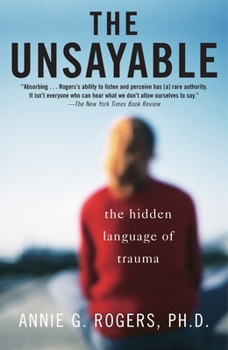The Unsayable: The Hidden Language of Trauma
Select Format
Select Condition 
Book Overview
In her twenty years as a clinical psychologist, Annie Rogers has learned to understand the silent language of girls who will not-who cannot-speak about devastating sexual trauma. Abuse too painful to put into words does have a language, though, a language of coded signs and symptoms that conventional therapy fails to understand. In this luminous, deeply moving book, Rogers reveals how she has helped many girls find expression and healing for the sexual...
Format:Paperback
Language:English
ISBN:0812971663
ISBN13:9780812971668
Release Date:July 2007
Publisher:Ballantine Books
Length:320 Pages
Weight:0.57 lbs.
Dimensions:0.8" x 5.3" x 8.0"
Related Subjects
Abuse Child Abuse Dysfunctional Relationships Education & Reference Family Relationships Health, Fitness & Dieting Health, Fitness & Dieting Internal Medicine Medical Medical Books Medicine Mental Health Parenting & Relationships Pathologies Psychology Psychology & Counseling Self Help Self-Help Self-Help & PsychologyCustomer Reviews
5 ratings
Something missing for me...
Published by Thriftbooks.com User , 17 years ago
I really enjoyed this book and learned from it, but found it less compelling than "A Shining Affliction". Possibly I felt that Rogers was trying very hard to convince me of the validity of Lacanian theory. It felt a tad defensive - as though somehow she was warding off a critical audience in her use of Lacan to understand what some of her patients were going through. And yes, at times the word-play felt a bit excessive and the meaning forced. However the reason I loved this book and Rogers' work is her ability to tolerate ambiguity and nuance, and find a way into relationship with patients who are desperately alone in their experience and their minds. I always learn from her, and so appreciate her willingness to share the struggle for understanding in the name of healing and connectedness.
Rogers trusts her readers
Published by Thriftbooks.com User , 17 years ago
I am not an expert in this field. This book was an introduction to a deep way of thinking about humanity. About Freud and psychoanalysis. The book takes the reader through a process. The authors experience, clues, cases, clues, structure, clues. Trusting the reader, Ann Rogers takes the care to let our consciousness unfold. The material and stories of the girls and of her reactions is frightening. Horrifying. Her technique of not blaming the perpetrator nor leaving the victim in the sole role of victim was difficult but at the same time open doors to understanding the past, the behaviors and the future. I can't recommend it more highly.
At a loss for words
Published by Thriftbooks.com User , 17 years ago
It's probably not a coincidence that it is difficult to put into words what Annie has communicated in her book about the hidden language of trauma. Through her entrancing and lyrical use of language, she somehow magically illustrates how the invisible marks of trauma on the body repeatedly surface through the spoken--and more importantly non-spoken--language. In her work with traumatized children, Annie mirrors back traces of their unconscious she remarkably detects in both their words and silences, and ultimately helps the child to give voice to the haunting "unsayable." Admittedly, I am still trying to process all that was said in this book. And as I do so, I take comfort in Annie's final words of the book when she said: "..if your body in pieces has begun to speak, and if you are now brimming with words and their sounds--and you're no longer sure of what you're hearing or saying...you are the one person I've written this for, the one to whom I entrust these words."
Profound, inspiring, helpful!
Published by Thriftbooks.com User , 18 years ago
I'm a survivor of childhood sexual abuse. I'm just beginning to deal with it at the age of 17. An older friend of mine sent me this book in hopes it would help. I didn't expect it to help so much. I went through it with a highlighter, marking all the meaningful, important lines; each page is near fully yellowed. I read this book in a week. I could not put it down. Highly, highly recommended--not only for CSA survivors, but for psychologists, and anyone else interested in understanding.
Illuminating
Published by Thriftbooks.com User , 18 years ago
With an emphasis on words and the associations we make with them, Rogers unveils how some children continue to re-experience and re-live past trauma. First, she describes her own childhood crises in a narrative that is both revealing and intimate. She describes her state in ways that allow one to experience it as she had, instead of something simply as foreign and "over with." Then, through example, we follow her as she tries to understand what the children's gestures and words are trying to "say" without their being able to verbalize it. However, she uses the children's own meanings of things (instead of simply standard symbolic meanings) to re-explain to them what has happened and how it continues to persist in their lives, unwittingly. This is what keeps it fresh and real. Moreover, throughout the book, there is an unstated underlying stream of empathy and relatedness. A great book.





